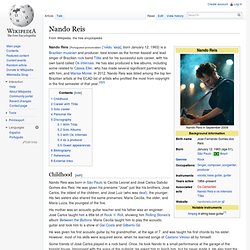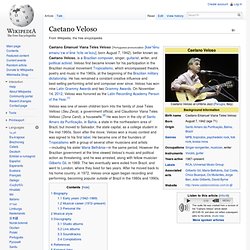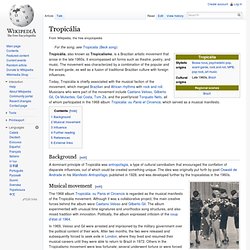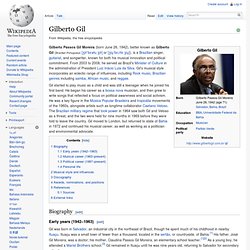

Nando Reis. Nando Reis (Portuguese pronunciation: [ˈnɐ̃du ˈʁejs], born January 12, 1963) is a Brazilian musician and producer, best known as the former bassist and lead singer of Brazilian rock band Titãs and for his successful solo career, with his own band called Os Infernais.

He has also produced a few albums, including some related to Cássia Eller, who has made several significant partnerships with him, and Marisa Monte. In 2012, Nando Reis was listed among the top ten Brazilian artists at the ECAD list of artists who profited the most from copyright in the first semester of that year.[2][3] Childhood[edit] Nando Reis was born in São Paulo to Cecília Leonel and José Carlos Galvão Gomes dos Reis. He was given his prename "José" just like his brothers, José Carlos, the oldest of the children, and José Luiz (who was deaf), the younger. His mother was an acoustic guitar teacher and his father was an engineer.
Some friends of José Carlos played in a rock band. Caetano Veloso. Veloso was one of seven children born into the family of José Teles Velloso (Seu Zeca), a government official, and Claudionor Viana Teles Velloso (Dona Canô), a housewife.[2] He was born in the city of Santo Amaro da Purificação, in Bahia, a state in the northeastern area of Brazil, but moved to Salvador, the state capital, as a college student in the mid-1960s.

Soon after the move, Veloso won a music contest and was signed to his first label. He became one of the founders of Tropicalismo with a group of several other musicians and artists—including his sister Maria Bethânia—in the same period. However the Brazilian government at the time viewed Veloso's music and political action as threatening, and he was arrested, along with fellow musician Gilberto Gil, in 1969. The two eventually were exiled from Brazil, and went to London, where they lived for two years. Biography[edit] Early years (1942–1969)[edit] Musical career (1972–present)[edit] Tropicalismo. Tropicália, also known as Tropicalismo, is a Brazilian artistic movement that arose in the late 1960s.

It encompassed art forms such as theatre, poetry, and music. The movement was characterized by a combination of the popular and the avant-garde, as well as a fusion of traditional Brazilian culture with foreign influences. Today, Tropicália is chiefly associated with the musical faction of the movement, which merged Brazilian and African rhythms with rock and roll. Musicians who were part of the movement include Caetano Veloso, Gilberto Gil, Os Mutantes, Gal Costa, Tom Zé, and the poet/lyricist Torquato Neto, all of whom participated in the 1968 album Tropicália: ou Panis et Circencis, which served as a musical manifesto. Background[edit] A dominant principle of Tropicália was antropofagia, a type of cultural cannibalism that encouraged the conflation of disparate influences, out of which could be created something unique.
Gildo e Toquinho. Gilberto Gil. Biography[edit] Early years (1942–1963)[edit] Gil was born in Salvador, an industrial city in the northeast of Brazil, though he spent much of his childhood in nearby Ituaçu.

Ituaçu was a small town of fewer than a thousand, located in the sertão, or countryside, of Bahia.[1] His father, José Gil Moreira, was a doctor; his mother, Claudina Passos Gil Moreira, an elementary school teacher.[1][2] As a young boy, he attended a Marist Brothers school.[3] Gil remained in Ituaçu until he was nine years old, returning to Salvador for secondary school. Gil's interest in music was precocious: "When I was only two or two and a half," he recalled, "I told my mother I was going to become a musician or a president of my country.
Musical career (1963–present)[edit] Gil met guitarist and singer Caetano Veloso at the Universidade Federal da Bahia (Federal University of Bahia) in 1963. Gilberto Gil performing in 2007 Political career (1987–present)[edit] Personal life[edit] Alan Fine - The Book.